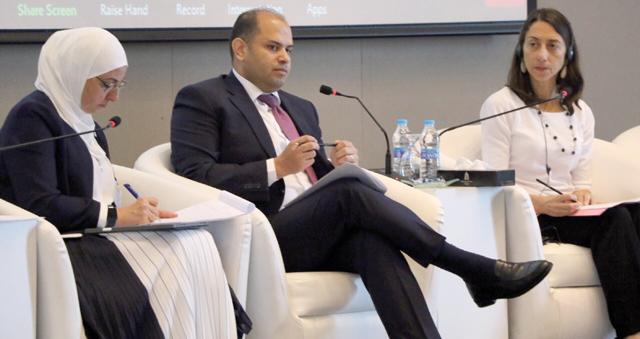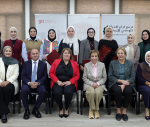You are here
More needed to improve ‘stagnating’ global trade position of MENA region — OECD
By Ana V. Ibáñez Prieto - Nov 27,2018 - Last updated at Nov 27,2018
DEAD SEA — The region requires a new economic model that is based on the expansion of trade and investments for better integration into the world and the global value chains (GVCs), a senior official said on Tuesday.
“Moving ahead with the economic reform process requires us to continually review our investment policies and frameworks to optimise the application of such policies and to identify opportunities and challenges in the global economy,” Minister of State for Investment Affairs Muhannad Shehadeh.
The minister’s remarks came during the latest meeting of the MENA-OECD Working Group on Investment and Trade held at the Dead Sea, which aimed at fostering policy dialogue and analysing the trade and investment interconnections in the MENA region.
Founded in 1961, the Organisation for Economic Cooperation and Development (OECD) works on stimulating economic progress and world trade, fighting poverty and ensuring the environmental impact of growth and social development is always considered.
Co-chaired by Japan and Jordan, the new group replaced the OECD Working Group on Investment Policies and Promotion in September 2017, seeking to build on the relevant OECD statistical tools to improve policy orientations, implementation and evaluation.
“International collaboration on investments has become extremely relevant over the past years,” Japan co-chair of the working group Koichi Ai said, expressing hopes to “develop innovative ideas for investment and accelerate structural reforms in all countries of the region”.
“The biggest challenge facing our region is the need to create jobs for its growing population,” Shehadeh said during the opening ceremony, calling for a “new economic model based on the expansion of trade and investment links with the rest of the world and the integration of the region into the GVCs.
“We must stimulate domestic investment and increase the number of partnerships with the private sector, especially considering that the MENA region has the potential of a geographical location that serves as a commercial bridge between East and West markets,” Shehadeh said.
He added that the Kingdom has implemented a plan aimed at attracting capital and stimulating domestic investment, noting that the response of the Jordanian and foreign private sectors has been tangible in an increase in the flow of foreign investments by 7 per cent.
On the status of the world’s economy, OECD senior counsellor Karim Dahou, highlighted the shift in global trade towards east Asia, lamenting that “while several emerging economies in the East continue to grow, the MENA region is still lagging behind”.
Elaborating on the actions that the region’s economies shall take in the current economic climate, Dahou said much more needs to be done in terms of trade and investment even countries that already put reforms in place, recommending the development of the services sector as “a potential generator of exports and employment for the region’s youth”.
“In the recent years, many MENA economies have undertaken sweeping legislative and institutional reforms to better promote investment and exports — and yet, there still remains potential for attracting more foreign direct investments [FDI] and boosting exports,” the working group said in a statement.
The group also warned that the global position of the region on investments and trade is “stagnating”, noting that its share of global trade stood at 4.8 per cent in 2017, while the region’s weight represented only a 1.7 per cent of the total FDI inflow in 2016.
In order to boost growth and generate jobs through investment and trade, the region shall exert reform efforts to ensure a right balance between national objectives and openness, according to the group.
“Jordan has adopted a number of policies aimed at developing the national economy and making it open to regional and international markets,” Shehadeh said, stressing the need to absorb the growing annual flow of Jordanian job seekers and refugees coming from the neighboring countries.
The meeting attracted high level policymakers and experts in investment and trade policies from MENA and OECD economies, in addition to representatives of regional institutions, international organisations, academia and civil society.
Building on the working group’s mandate adopted at the OECD-MENA conference in Tunis in 2016, the discussions held over the two-day meeting focused on the way countries and societies can enhance benefits from trade and investments, as well as the MENA region’s integration into the GVCs and the role of local linkages to support economic and social development.
The sessions also tackled the ways to promote inclusive trade and investment policies that create opportunities for women, workers and refugees alike, and the key challenges to the successful implementation of all potential reforms.
Related Articles
AMMAN — The launch of the “FDI Qualities Review of Jordan: Strengthening Sustained Investment” report on Wednesday highlighted the need for
AMMAN — The IFC, a member of the World Bank Group, and the government of the Netherlands on Monday launched a multi-sector programme in Jord
AMMAN — During a panel discussion titled “Set Reforms in Motion” on Wednesday, experts and officials emphasised the need for foreign direct
















